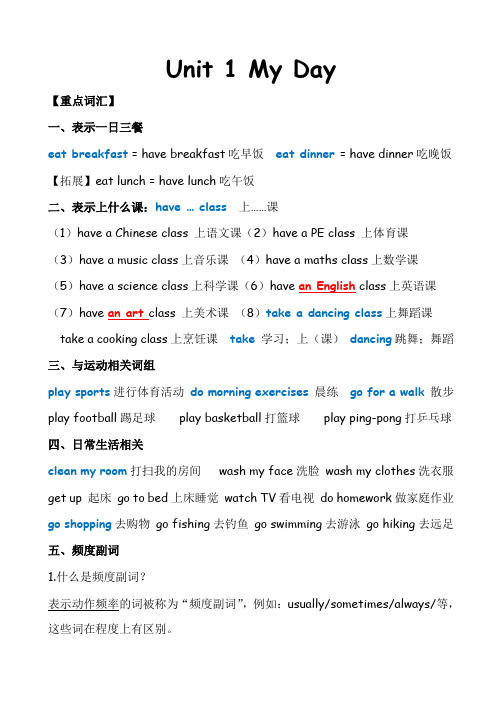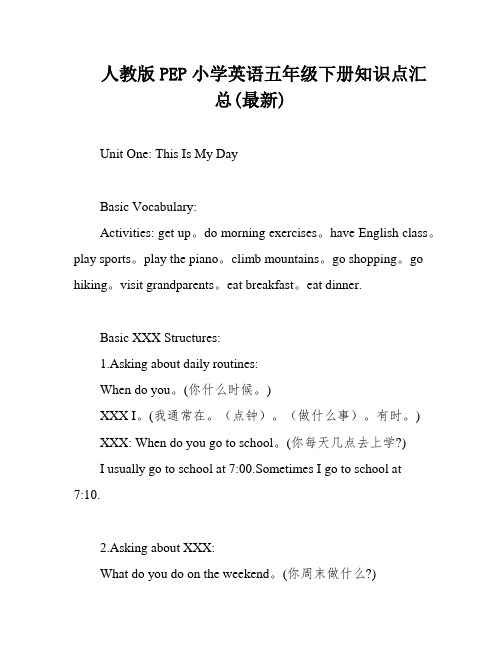人教版五年级英语下册Unit1知识点汇总
Unit1Myday(讲义)-人教PEP版英语五年级下册(1)

PEP英语五年级下册Unit 1 知识梳理【单元语音归纳】一、单词:eat breakfast[ˈbrekfəst]吃早餐 a.m上午have···class 上···课p.m 下午play sports 进行体育运动why 为什么exercise[ˈeksəsaɪz]活动;运动。
shop 去买东西;购物do morning exercises做早操work[wɜ:k] 工作eat dinner吃晚饭last [lɑ:st]上一个的;刚过去的clean my room 打扫我的房间sound[saʊnd] 听起来好像go for a walk 散步also[ˈɔ:lsəʊ] 还;也go shopping 去买东西;购物busy[ˈbɪzi] 忙的take学习;上(课)need[ni:d] 需要dancing[ˈdɑ:nsɪŋ] 舞蹈play 戏剧;剧本take a dancing class 上舞蹈课letter[ˈletə(r)] 信when 什么时候live[lɪv] 居住after 在(时间)后island[ˈaɪlənd] 岛start 开始always[ˈɔ:lweɪz] 总是;一直usually[ˈju:ʒuəli] 通常地cave[keɪv] 山洞Spain[speɪn] 西班牙go swimming 去游泳late[leɪt] 晚;迟win[wɪn] 获胜二、词语1. eat breakfast 吃早饭2. have…class 上……课3. play sports 进行体育活动4. exercise活动;运动5. do morning exercises 做早操6. eat dinner 吃晚饭7. clean my room 打扫我的房间8. go for a walk散步9. go shopping 去买东西;购物10. take 学习;上(课)11. dancing 跳舞;舞蹈12. take a dancing class 上舞蹈课13. go swimming去游泳【重点句型再现】1. 询问对方什么时间做某事的句型及答语—When do you finish class in the morning? 你们上午的课几点结束?—We finish class at 1 o’clock. 我们一点钟结束上午的课。
人教版五年级英语上册各单元以及下册unit1知识点详细归纳(附带练习题)

Un it 1 What 'she like 、单元词汇old年老的polite 有礼貌的clever 聪明的you ng年轻的funny滑稽的kind和蔼的strict严格的hard-working工作努力的helpful愿意帮助的shy害羞的二、单元知识点一般疑问句的改法:①类句子:含有be动词作谓语的句子、或者含有情态动词(will、can、should等)的英语句子,改为疑问句时,把be动词/情态动词提到句首即可!例如:He is very helpful Is he very helpful ?They are hard-working Are they hard-working ?Mike can do kung fu Can Mike do kung fu ?②类句子:含有实义动词作谓语的句子,改为疑问句时,在句首加do/does,主语是第三人称单数时加does,并且谓语动词要去掉三单形式变回原形!例如:I know Mary 宀Do you know Mary ?They play football on the playground ? Do they play football on the playground ?三单形式:当主语是第三人称单数时,后面的实义动词谓语必须是三单形式(一般在实义动词后加s)例如:I read books 宀He reads booksYou play the piano He plays the piano三单形式的句子改为一般疑问句:Does he read books?Does he play the piano ?另外要注意:第一人称和第二人称要互相转换!练习:将下列句子改为一般疑问句:1、I am very helpfull at home _________________________________2、She will come to my birthday party __________________________3、I know ________________________________________________4、He knows _____________________________________________1、Do you know Mr You ng ?这是一个疑问句,陈述句原来是肯定回答:Yes, I do否定回答:No, I don '我的笔I pen (x) my pen (V)I know Mr You ng,②类句子你的尺子you ruler (x) your ruler (V)____ pen 我的钢笔__________ parents 她的父母___________ h ouse 他们的房子3、Is your English teacher strict?原来的陈述句:My English teacher is strict,①类句子,所以改为疑问句只须把be动词提到句首即可,my 变为yourBe 动词+ 人+ 描述体貌特征或性格特点的形容词?意为“某人是 ......... 的吗?”肯定回答:Yes,人+ be动词否定回答:No,人+ be动词not例如:——Is your P.E. teacher funny?——Yes, he is——Are your parents strict ?——No, they aren 't 你的体育老师高吗?是的,她很高你的数学老师年轻吗?不,她不年轻4、如何询问别人某一学科的老师是谁?可以借用特殊疑问词who (谁)的帮助,Who ' s your +学科+ teacher ?意为"你的........ 老师是谁?”回答:Mr/Mrs/Miss + 姓氏例如:——Who is your English teacher ?——Miss Green——Who is your math teacher ?——Mr Ma5、what is he like ?在这句话中, like 不是“喜欢”的意思,而是“像....... 一样”的意思,因为like有两种词性:① 动词,意为“喜欢”,实义动词谓语,不能和be动词同时出现;I like hamburger ;I like apples and grapes② 介词,意为“像……一样”,可以跟在be动词后面作表语;Their child is like him His words are like wisdom询问别人的体貌特征或性格特点的句型:What ' s +某人+ like?,意为询问“某人是像……样的/某人怎么样?” 回答:He' s/She's+ 描述体貌特征或性格特点的形容词.例如:——What is she like?——She is tall and thin——What is your art teacher like ?——He is young and funny6、频率副词sometimes (有时候),usually (通常),often (经常),通常放在主语和动作之间I sometimes read books in the morningI often play football on the playgroundI usually do my homework at 8 o 'clock7、 m ust 是情态动词,情态动词后面跟谓语动词原形(两类谓语)He is tall and strongHe must be tall and strongShe is our new English teacherShe will be our new English teacher 8、 l et me help youLet sb do sth , sb = somebody (某人),sth = something (某事),意为"让某人做某 事”, sb 如果是人称代词,那必须得是宾格形式的Let 'sgo to school = let us go to school Let Mike help you Let him come inUnit 1 单元习题、选出不同类的单词,并将其序号填到题前的括号内。
(完整版)人教版五年级英语下册Unit1知识点汇总

Unit1 My day 知识整理△话题:谈论每天的活动及时间安排△词汇:do morning exercises(做早操)eat breakfast/lunch/dinner(吃早餐/午餐/晚餐)have...class(上…课),play sports(做运动)clean my room(打扫我的房间),go for a walk (散步) go shopping(购物),take a dancing class(上舞蹈课)△拓展词汇:get up(起床), go to bed(上床睡觉)wash my clothes(洗我的衣服), watch TV(看电视)do homework(做作业), play music(演奏音乐)cook dinner(煮晚餐), at home(在家)in the morning(在上午),in the afternoon(在下午)in the evening(在晚上),at night(在半夜)△句型:①询问做某事在几点When do you+动词原形(短语)+其他?—— At +时间—— I(+频度副词)+动词原形(短语)+at+时间。
例句:When do you get up in the morning?—— At 7:30.—— I often get up at 7:30.②询问周末的活动安排What do you often do on the weekend?I often (always/sometime/usually) +…(周末的活动)+with … (某人)+on the weekend (on Saturdays/on Sundays ).例句:What do you do on the weekend ?I often take a dancing class with my friend on Sundays. △知识点:1:注意介词的搭配at +具体时间(几点)/night/home at 9 o ’clock in +国家/季节 in Spainon +星期 on the weekend/on Sundays with +人 with my father/mother/friend 2:表示时间频率词的区别always 表示总是,一直;usually 表示经常,通常;often 表示经常,常常;sometimes 表示有时,间或。
英语单词快速记忆课件教案人教版五年级下册 Unit 1-6

go swimming 去游泳
win [wɪn] 获胜 分析:w-乌鸦、in-在里面 记忆方法:乌鸦在里面获胜了。
谢谢观看!
人民教育出版社
五年级下册--Unit 2
spring [sprɪŋ] 春天 分析:sp-饰品、ri-日、ng-难过 记忆方法:春天买的饰品戴了一日就不见了很难过。
summer [ˈsʌmə(r)] 夏天 分析:s-蛇、u-酒杯、mm-慢慢、er-儿(子) 记忆方法:夏天的夜晚,蛇绕过酒杯慢慢接近儿子。
make a snowman 堆雪人
go swimming 去游泳
which [wɪtʃ] 哪一个 分析:wh-五环、i-蜡烛、ch(i)-吃 记忆方法:五环上的蜡烛是哪一个人吃了?
best [best] 最;最高程度地 分析:be-是、st-石头 记忆方法:这是最好的一块石头。
snow [snəʊ] 雪 分析:s-蛇、now-现在 记忆方法:蛇太热了,它希望现在就下雪。
good job 做得好
because [bɪˈkɒz] 因为 分析:be-笨鹅、ca-擦、use-使用
记忆方法:笨鹅不会擦黑板是因为他不会使用黑板檫。
vacation [vəˈkeɪʃn] 假期 分析:v-五、ac-AC米兰、ation-苹果神(乔布斯/ 牛顿) 记忆方法:五个AC米兰队员在假期去看望苹果神。
autumn [ˈɔ:təm] 秋天 分析:au-谐音“哎呦”、tu-兔、mn-美女
记忆方法:哎呦,秋天看到穿长袖兔子衣服的美女。
winter [ˈwɪntə(r)] 冬天 分析:win-赢、ter-天鹅肉 记忆方法:冬天比赛赢了吃天鹅肉。
season [ˈsi:zn] 季节 分析:sea-海、son-儿子 记忆方法:这个季节喜欢在海边玩水的儿子。
人教PEP版五年级英语下册 Unit 1 My day 知识点清单

Unit 1 My day一、核心词汇1.动词: take 学习;上(课)2.名词: dancing跳舞;舞蹈exercise活动;运动3.短语: do morning exercises做早操eat breakfast吃早饭play sports进行体育运动eat dinner吃晚饭go for a walk散步go shopping去买东西;购物clean my room 打扫我的房间take a dancing class 上舞蹈课have … class 上……课二、了解词汇1.动词: start开始shop去买东西;购物work工作need需要live居住win获胜sound听起来好像2.名词: Spain西班牙play戏剧;剧本letter信island岛cave山洞;洞穴3.介词: after在(时间)后4.其他: when什么时候;何时late晚;迟 a.m.午前;上午p.m.午后;下午why为什么last上一个的;刚过去的also还;也busy 忙的5.拓展词汇——频率副词(1)定义: always, usually, sometimes等词叫作频率副词,用来表示动作发生的频率,但程度上有区别。
按频率大小可做如下排列: always > usually > sometimes(2)位置:频率副词一般放在主语之后、实义动词之前。
I always get up at 6:30. 我总是六点半起床。
I usually watch TV on the weekend. 我周末通常看电视。
(usually也可用于句首)I sometimes visit my grandparents. 有时我看望我的祖父母。
(sometimes也可以放在句首)6.短语:watch TV看电视eat lunch吃午饭go to bed上床睡觉go swimming去游泳 go home回家go to school去上学三、核心句型1.— When do you do morning exercises? 你什么时候做早操?— At 7 o’clock. 七点。
人教版PEP英语五年级下册Unit1-My-Day知识点归纳与练习(含答案)

Unit 1 My Day【重点词汇】一、表示一日三餐eat breakfast = have breakfast吃早饭eat dinner= have dinner吃晚饭【拓展】eat lunch = have lunch吃午饭二、表示上什么课:have … class 上……课(1)have a Chinese class 上语文课(2)have a PE class 上体育课(3)have a music class上音乐课(4)have a maths class上数学课(5)have a science class上科学课(6)have an English class上英语课(7)have an art class 上美术课(8)take a dancing class上舞蹈课take a cooking class上烹饪课take学习;上(课)dancing跳舞;舞蹈三、与运动相关词组play sports进行体育活动do morning exercises晨练go for a walk散步play football踢足球play basketball打篮球play ping-pong打乒乓球四、日常生活相关clean my room打扫我的房间wash my face洗脸wash my clothes洗衣服get up 起床go to bed上床睡觉watch TV看电视do homework做家庭作业go shopping去购物go fishing去钓鱼go swimming去游泳go hiking去远足五、频度副词1.什么是频度副词?表示动作频率的词被称为“频度副词”,例如:usually/sometimes/always/等,这些词在程度上有区别。
2.常见频度副词按频率大小排列如下:always(100%)>usually(80%)>often(60%)>sometimes(20%~40%)> never (0%)3.注意频度副词的使用位置:①We usually go to school at seven in the morning.②What do you often do on the weekend?六、常见时间的表达方式1.at + 具体的几点钟;at noon在中午;at night在晚上2.in +月份/季节/早中晚例如:in the morning/afternoon/evening3.关于on表示时间的几种情况:①on + 星期几;②on + 几月几日;③on the weekend在周末;④on Monday morning星期一早上。
人教版PEP小学英语五年级下册知识点汇总(最新)

人教版PEP小学英语五年级下册知识点汇总(最新)Unit One: This Is My DayBasic Vocabulary:Activities: get up。
do morning exercises。
have English class。
play sports。
play the piano。
climb mountains。
go shopping。
go hiking。
visit grandparents。
eat breakfast。
eat dinner.Basic XXX Structures:1.Asking about daily routines:When do you。
(你什么时候。
)XXX I。
(我通常在。
(点钟)。
(做什么事)。
有时。
)XXX: When do you go to school。
(你每天几点去上学?)I usually go to school at 7:00.Sometimes I go to school at7:10.2.Asking about XXX:What do you do on the weekend。
(你周末做什么?)XXX I。
(我通常/经常。
有时。
)XXX: What do you do on the weekend?I often play XXX I go shopping with my mom.3.Introducing one's own habits:Every weekend。
I go hiking。
(我每个周末远足。
)Every day。
I do my homework at 8:00 in the evening。
(我每天晚上8点做作业。
)4.Asking XXX:What do you do。
(你是干什么的?)Time:morning。
afternoon。
evening。
noon。
at night。
6:00.on Sunday。
五年级下册英语第1单元

五年级下册英语第1单元
五年级下册英语第1单元的标题是“My Day”。
这一单元主要围绕学生的日常生活展开,通过学习,学生可以掌握描述自己一天中不同时间段的活动和日常习惯的表达方式。
以下是五年级下册英语第1单元的主要内容和知识点:
1.新词汇:学习新的单词和短语,如“get up”(起床)、“eat breakfast”(吃
早饭)、“have classes”(上课)等,以及与日常生活相关的词汇。
2.重点句型:学习如何使用现在进行时描述正在进行的动作,例如“I’m
getting up.”(我正在起床。
)以及如何使用一般现在时描述日常习惯,例如“I usually eat breakfast at 7:00.”(我通常7点吃早饭。
)
3.对话和短文:通过阅读对话和短文,了解如何用英语描述自己的一天,包括
起床、吃早饭、上学、上课、吃午饭、放学、做家庭作业和睡觉等日常活动。
4.语音和语调:学习正确的语音和语调,以便更自然地表达日常活动。
5.文化知识:了解不同国家和地区的日常生活习惯和作息时间,增加跨文化交
流的能力。
通过学习这一单元,学生可以提高自己的英语口语和书面表达能力,更好地用英语描述自己的日常生活和习惯。
学生还可以学习如何合理安排时间,养成良好的生活和学习习惯。
1/ 1。
- 1、下载文档前请自行甄别文档内容的完整性,平台不提供额外的编辑、内容补充、找答案等附加服务。
- 2、"仅部分预览"的文档,不可在线预览部分如存在完整性等问题,可反馈申请退款(可完整预览的文档不适用该条件!)。
- 3、如文档侵犯您的权益,请联系客服反馈,我们会尽快为您处理(人工客服工作时间:9:00-18:30)。
Unit1 My day 知识整理
△话题:谈论每天的活动及时间安排
△词汇:do morning exercises(做早操)
eat breakfast/lunch/dinner(吃早餐/午餐/晚餐)
have...class(上…课),play sports(做运动)
cleanmyroom(打扫我的房间),go forawalk (散步) go shopping(购物),takeadancingclass(上舞蹈课)
△拓展词汇:get up(起床),go to bed(上床睡觉)
washmy clothes(洗我的衣服), watch TV(看电视)
do homework(做作业), play music(演奏音乐)
cook dinner(煮晚餐), at home(在家)
inthemorning(在上午),intheafternoon(在下午)
intheevening(在晚上),atnight(在半夜)
△句型:
①询问做某事在几点
When doyou+动词原形(短语)+其他?
—— At +时间
—— I(+频度副词)+动词原形(短语)+at+时间。
例句:When do you get up in the morning?
—— At 7:30.
—— I often get up at 7:30.
②询问周末的活动安排
What do you often do on the weekend ?
I often (always/sometime/usually) +…(周末的活动)+with … (某人)+ontheweekend (onSaturdays/on Sundays ).
例句:What do you do on the weekend ?
I often take a dancing class with my friendon Sundays. △知识点:
1:注意介词的搭配
at +具体时间(几点)/night/home at 9 o ’clock
in +国家/季节 in Spain
on +星期 on the weekend/on Sundays with +人 with my father/mother/friend 2:表示时间频率词的区别
always 表示总是,一直;
usually 表示经常,通常;
often 表示经常,常常;
sometimes 表示有时,间或。
按它们的频率大小排列如下:
always (100%)→usually (80%)→often (60%)→sometimes (40%) 3:其他知识点
also 用于句中
1) 也 too too 用于肯定句中
用于句末
either either用于否定、疑问句中2)need…to…需要去做某事(need a robot to help you)be good at 擅长(be动词有三个:am is are)
【be动词口诀:我用am,你用are,is跟着他她它,单数is,复数are】3)反义词(对应词):finish—start late—early
结束开始晚早
△语法:动词词组的固定搭配
go +动词ing
例如:go swimming(去游泳),go running(跑步)
go shopping(购物),go boating(划船)
play+(不加the)运动/the乐器
例如:playsports(做运动),playfootball(踢足球)
play ping-pong(打乒乓球),play the pipa(弹琵琶)
have +课程/三餐
例如:haveEnglish/Chineseclass ,have dinner、
do 做什么事情
例如:do homework,do kungfu,do morning exercises
△语音:
cl 发音为| kl | pl发音为| pl |
拓展:第三人称单数形式(简称:三单形式)
下页
第三人称单数形式
一、什么是第三人称单数?
人称分为三类:第一人称,第二人称和第三人称。
第一人称:I我,we我们
第二人称:you你/你们
第三人称:he他,she她,it它,they他们和人名类(如:Peter,Amy,myfather 等)
结合以上知识,第三人称单数就是he, she, it和单个的某人,也包括单个的小动物。
二、动词为什么要变成相应的三单形式?
在一般现在时中,跟在第三人称单数后面的动词也要变成相应的三单形式。
例如: I watch TV every day. 如果主语是三单,动词要变化:
He watches TV every day.
She watches TV every day.
Jane watches TV every day.
三、动词三单的构成规则:
1.一般情况下,直接加-s 如:play-play s,see-see s,like-like s
2.以o. x. s. sh. ch. 结尾,加-es,
如:wash-wash es洗,watch-watch es看,go-go es去,do-do es做
guess-guess es猜,
3.以“辅音字母+y”结尾,变y为i, 再加-es 如:study-stud ies学习
4. 特殊变化:have-has
四、does和doesn’t 在句中的用法:
1.否定句:主语+don’t/doesn’t+动词原形(+其它)。
如:I don’t like watching TV. 我不看电视。
当主语为第三人称单数时,要用doesn’t构成否定句。
如:He doesn’t like watching TV. 他不喜欢看电视。
【注意doesn’t 后面用动词原形like,而不是likes.】
2.一般疑问句:Do(Does)+主语+动词原形+其它。
如:Do you often watch TV? 你经常看电视吗?
——Yes, I do. / No, I don’t.
当主语为第三人称单数时,要用does构成。
如:Does she/he oftenwatch TV?
——Yes, she/he does. / No, she/he doesn’t.
【do问do答,does问does答,肯定Yes否定No】
3.特殊疑问句:疑问词+一般疑问句。
如:What do you do on the weekend? 你在周末都做什么?
——I often go shopping with my mum. 我经常和我妈妈去购物。
What does she often do on the weekend? 她经常在周末做什么?——She often goes shopping with her mum. 她经常和她妈妈去购物。
【does见原形现,does不见原形变】。
